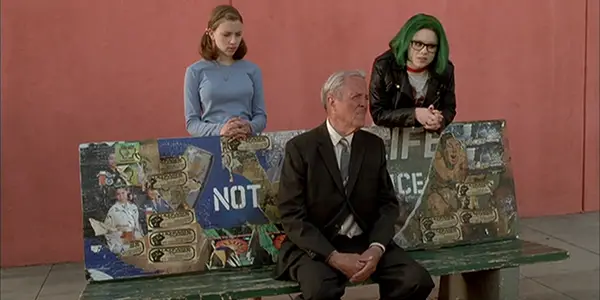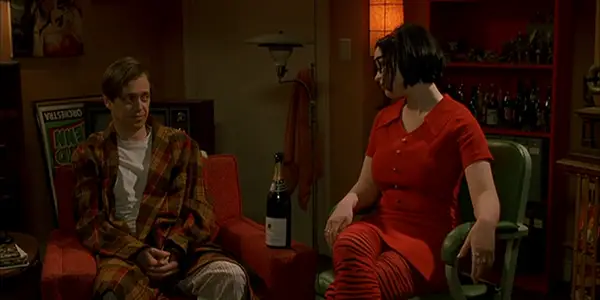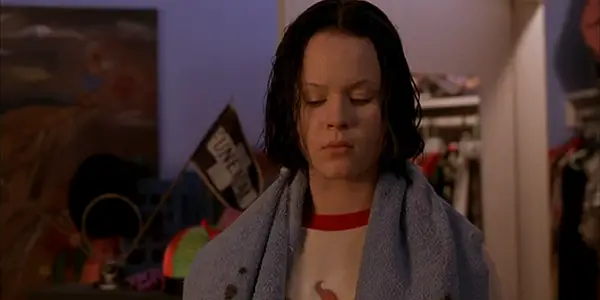Sarcasm & Sincerity In Terry Zwigoff’s GHOST WORLD

Joe George teaches English at the University of North Carolina…
“Joey McCobb is our God.”
This is the declaration Enid (Thora Birch), protagonist of the 2001 Terry Zwigoff film Ghost World, makes to her best friend Rebecca (Scarlett Johansson). They direct their adoration not toward a rock star or a handsome actor, but to an awkward comedian who mumbles non-jokes like, “Take my life, please.” McCobb is just one of many forms of rejected pop culture to which the girls gravitate. They express themselves through the kitschy and the offensive, whether it be sex shops or a pseudo-1950s diner called Wowsville.
What appeal could Joey McCobb and these other oddities have for two recent high school graduates? We really don’t know for sure, and that’s why they embrace them. Their love is ironic in the classical sense, undermining interpretive surety. So when the girls see an odd-looking man and woman walking under umbrellas on a nice day, we might take their snickering to mean that they dislike the couple.
But when Enid and Rebecca designate the couple as “Satanists” and decide to follow them for few blocks, they seem to be acting out of admiration. No one piece of evidence provides firm explanation.
This ambiguity gives Enid and Rebecca a communal language, allowing them to distance themselves from the rest of the world. They consider themselves misunderstood by their peers, and they enact this estrangement by ironically praising bad pop culture.
“Everybody’s Too Stupid!”
Their strategy works because nearly everyone in the movie uses art, high and low, as a way to express themselves. As one might expect of a movie based on a series of short comics by cartoonist Daniel Clowes, Ghost World is filled with popular culture, including everything from ragtime 78s’ to 90’s rap to pretentious art films.

Although Ghost World presents most of these elements satirically, asking us to laugh at the reggae-loving frat boys or video game addled teenagers, the movie also acknowledges their potential for genuine beauty. In one of the most powerful scenes, Enid returns from a particularly tense interaction with her peers and puts on a blues record she recently bought from Seymour, a middle-aged music aficionado played by Steve Buscemi.
When the song “Devil Got My Woman” by Skip James comes on, the camera holds on Enid as she takes it in. It slowly circles around Birch, whose tiny glances between the record player and the floor reveal Enid’s identification with the song’s lament. Gone is the ambiguity of her earlier irony, replaced by honest appreciation of forgotten blues.
This shift from sarcasm to sincerity provides the groundwork for the maturing process the film portrays. It occurs alongside Enid and Rebecca’s pursuit of post-high school plans, with Rebecca taking a crappy barista job to earn money for an apartment, while Enid attends a summer art course to officially earn her degree. Although she claims to enjoy the same activities she did before, such as mocking their friend Josh and visiting the sex toy store, Rebecca’s interest in conventional adult behavior separates her from Enid.
“He’s such a clueless dork that he’s almost cool.”
Enid turns to Seymour, then, in an attempt to imagine herself as a grown up without losing her core identity. Although he lives a properly adult life, with his own place and a steady job, Seymour cannot relate to mainstream culture, preferring instead to hide among his records.

So while Enid’s rationale for her plot to find Seymour a girlfriend – “I can’t stand the idea of a world where a guy like you can’t get a date” – may be wish-fulfillment on the part of her misfit male creators Zwigoff and Clowes, it also indicates her desire to find a satisfying path for her future self.
Once again, Ghost World uses love of popular culture to illustrate the formation and dissolution of relationships. While Enid and Seymour bond over old music and intentionally forgotten racist advertisements, they grow distant when the latter’s new girlfriend gets him to wear jeans and dance to Ashford and Simpson’s “Solid (As a Rock).” When Seymour shrugs off Enid’s horrified response, the difference in interpretation is clear.
Throughout the film, Enid has similar interactions with nearly every other character: her art teacher dismisses her cartoons as a silly pastime, her theater manager refuses to share her aversion to summer blockbuster movies, acquaintances fail to recognize her late 70s punk look.
Even Rebecca responds to comedian Joey McCobb not by seconding the godhood status Enid gives him, but with a flippant joke: “I want to do him.” The camera lingers for a second on Enid’s hurt expression, indicating that she already knows that the two of them speak an increasingly different language.
Dead Pop Cultural Languages
While certain characters might deride certain elements of popular culture, Ghost World remains entirely sympathetic to the impulse to use it as a tool to build community. All characters use music and fashion to express themselves, and when another person has that appreciation – whether it be sarcastic or sincere – a connection is formed.

But the movie also understands this relationship is to be inherently short lived. As people change, so do their interpretations of pop culture, and thus so do the relationships. And so Ghost World’s depiction is not that of a living, thriving friendship, but one that has already died, haunting Enid as she tries to enter into adulthood.
Do you relate with the movie’s use of popular culture? How do you use pop culture within your community?
Does content like this matter to you?
Become a Member and support film journalism. Unlock access to all of Film Inquiry`s great articles. Join a community of like-minded readers who are passionate about cinema - get access to our private members Network, give back to independent filmmakers, and more.
Joe George teaches English at the University of North Carolina at Greensboro. When not teaching about books, movies, and comics, he's writing about books, movies, and comics. He can be found at joewriteswords.com or @jageorgeii on Twitter, but he can never be found outdoors.













